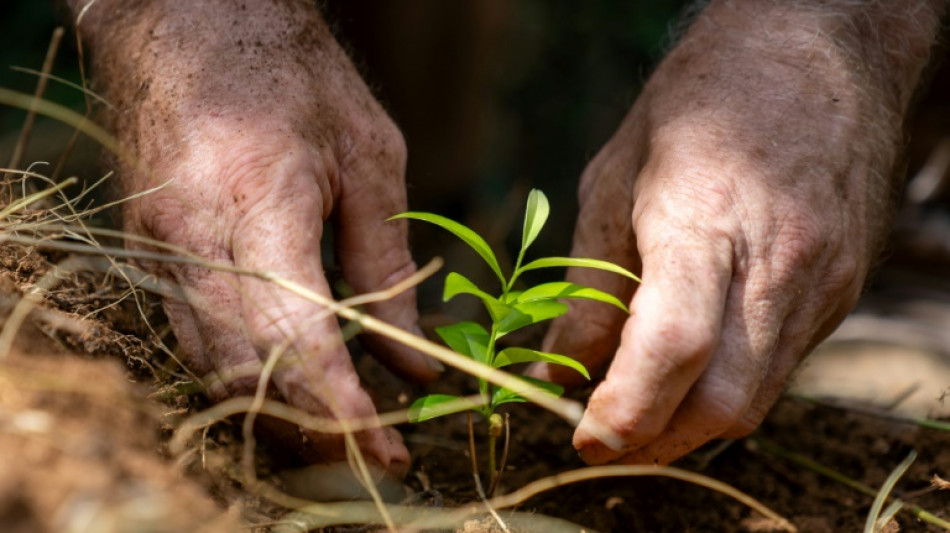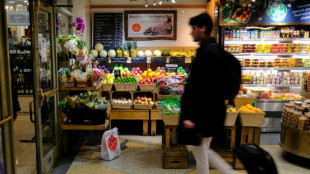
-
 'Not the end': Small US firms wary but hopeful on tariff upheaval
'Not the end': Small US firms wary but hopeful on tariff upheaval
-
US freestyle skier Ferreira wins Olympic halfpipe gold

-
 Svitolina edges Gauff to set up Pegula final in Dubai
Svitolina edges Gauff to set up Pegula final in Dubai
-
'Proud' Alcaraz digs deep to topple Rublev and reach Qatar final

-
 UK govt considers removing ex-prince Andrew from line of succession
UK govt considers removing ex-prince Andrew from line of succession
-
New study probes why chronic pain lasts longer in women

-
 Trump vows 10% global tariff after stinging court rebuke
Trump vows 10% global tariff after stinging court rebuke
-
Aston Martin in disarray as Leclerc tops F1 testing timesheets

-
 Venus Williams accepts Indian Wells wild card
Venus Williams accepts Indian Wells wild card
-
Anxious Venezuelans seek clarity on new amnesty law

-
 Last-gasp Canada edge Finland to reach Olympic men's ice hockey final
Last-gasp Canada edge Finland to reach Olympic men's ice hockey final
-
Scotland captain Tuipulotu grateful for Wales boss Tandy's influence

-
 Zelensky says no 'family day' in rare personal interview to AFP
Zelensky says no 'family day' in rare personal interview to AFP
-
Zelensky tells AFP that Ukraine is not losing the war

-
 Sweden to play Switzerland in Olympic women's curling final
Sweden to play Switzerland in Olympic women's curling final
-
Counting the cost: Minnesota reels after anti-migrant 'occupation'

-
 UK police probe Andrew's protection as royals reel from ex-prince's arrest
UK police probe Andrew's protection as royals reel from ex-prince's arrest
-
Doris says Ireland must pile pressure on England rising star Pollock

-
 US military assets in the Middle East
US military assets in the Middle East
-
Neymar hints at possible retirement after World Cup

-
 Stocks rise after court ruling against US tariffs
Stocks rise after court ruling against US tariffs
-
Australia end dismal T20 World Cup by thrashing Oman

-
 Olympics chief says Milan-Cortina has set new path for Games
Olympics chief says Milan-Cortina has set new path for Games
-
Russian SVR spy agency took over Wagner 'influence' ops in Africa: report

-
 Pegula fights back to sink Anisimova and reach Dubai final
Pegula fights back to sink Anisimova and reach Dubai final
-
Trump administration denounces 'terrorism' in France after activist's killing

-
 Colombia's Medellin builds mega-prison inspired by El Salvador's CECOT
Colombia's Medellin builds mega-prison inspired by El Salvador's CECOT
-
German broadcaster recalls correspondent over AI-generated images

-
 US Supreme Court strikes down swath of Trump global tariffs
US Supreme Court strikes down swath of Trump global tariffs
-
England's Itoje says managing 'emotional turmoil' key to 100 cap landmark

-
 Trump says weighing strike on Iran as Tehran says draft deal coming soon
Trump says weighing strike on Iran as Tehran says draft deal coming soon
-
Tudor is '100 percent' certain of saving Spurs from relegation

-
 Azam dropped for scoring too slowly, says Pakistan coach Hesson
Azam dropped for scoring too slowly, says Pakistan coach Hesson
-
Stocks volatile after soft US growth data, court ruling against tariffs

-
 Italy bring back Capuozzo for France Six Nations trip
Italy bring back Capuozzo for France Six Nations trip
-
From Malinin's collapse to Liu's triumph: Top Olympic figure skating moments

-
 Arteta urges Arsenal to 'write own destiny' after title wobble
Arteta urges Arsenal to 'write own destiny' after title wobble
-
Ukraine Paralympics team to boycott opening ceremony over Russian flag decision

-
 Wales captain Lake wants fans to bring 'noise' against Scotland
Wales captain Lake wants fans to bring 'noise' against Scotland
-
Skier Vonn's Italian hospital a hotbed of men, sister says

-
 India target S.Africa top order, Abhishek to come good: bowling coach
India target S.Africa top order, Abhishek to come good: bowling coach
-
Carrick praises Man Utd 'diversity' after Ratcliffe's immigrant rant

-
 I never thought it would be hit, says 'Scream' creator 30 years later
I never thought it would be hit, says 'Scream' creator 30 years later
-
AI summit statement delayed to 'maximise' signatories: India

-
 Barcelona's Sagrada Familia basilica hits peak height
Barcelona's Sagrada Familia basilica hits peak height
-
Milan sprints to second straight UAE stage win as Tiberi keeps lead

-
 US GDP growth misses expectations as Trump blames shutdown
US GDP growth misses expectations as Trump blames shutdown
-
Benfica investigate video of fans' monkey gestures

-
 French minister pledges tight security at rally for killed activist
French minister pledges tight security at rally for killed activist
-
Guardiola 'couldn't care less' about Arsenal stumble in title race


Hong Kong scientists fight to save fragrant incense trees
Geneticist Zhang Huarong walks through the forest near his Hong Kong research lab, gesturing towards a rotting incense tree stump that is one of over a dozen illegally felled for the valuable wood inside.
A stone's throw from the city's urban centre are forests home to trees that produce fragrant -- and valuable -- agarwood, used in a number of high-end products from incense and perfume to traditional Chinese medicine.
Environmentalists say illegal incense tree felling is on the rise in Hong Kong, fueled by black market demand.
Scientists like Zhang are fighting back by taking DNA samples from each plant and creating a database that can help authorities crack down -- as well as offer insights into how the trees can be better conserved.
"In one night, over 20 trees had been cut down by poachers," Zhang, a researcher at Kadoorie Farm and Botanic Garden, told AFP.
"We have to take action."
Hong Kong has long been a hub for sweet-smelling aromatic products. The city's name -- translating to "fragrant harbour" -- is commonly linked to the area's history of incense production and sale.
Agarwood is created when incense trees are cut, which causes the plant to produce a dark resin to prevent infection.
The product then takes the form of fragrant resinous wood.
- 'Black gold' -
Hong Kong authorities say that illegal incense tree felling soared twelvefold in 2023 compared to the previous year.
Often described as "black gold", the highest-grade products can fetch up to $10,000 per kilo.
International Union for Conservation of Nature (IUCN) has labelled Chinese Agarwood as "vulnerable" -- blaming logging and wood harvesting for the population decline.
Aiming to reverse that, Zhang and other field researchers hiked for hours through swathes of Hong Kong's dense jungle to access remote populations of incense trees.
Rural communities keen to protect the forests near their homes also assisted in developing the incense tree database, he told AFP.
"We have communications with those villages, and they share information with us about the remaining trees, and we also share our findings with them," he said.
The database serves a joint purpose: assisting authorities in stopping illegal incense tree felling and helping researchers understand the species' evolutionary potential.
Zhang said this research has identified unique genetic groups located in different areas of Hong Kong -- diversity that could be key to cultivating a resilient wild population of the vulnerable species.
Larger genetic diversity protects populations from environmental changes, Zhang explained.
For Hong Kong's incense trees, that includes the effects of climate change and surges in logging activity.
This information lets conservationists know where to transplant certain incense trees from nurseries into the wild.
Authorities can then use this genetic data to cross-reference seized agarwood and check if it was taken from protected incense trees.
Hong Kong shop owner Aaron Tang sells wares that attest to the many uses of agarwood, from carved jewellery to oils and hand-rolled joss sticks.
To help protect the wild agarwood population, he said he verifies with raw material suppliers that their product comes from cultivated trees.
And when he teaches a class on making joss sticks, he warns his students against buying wild stock, or falling for illegally gotten products.
"The name of Hong Kong is because of agarwood so I want to keep this culture," he said.
- 'Gone completely' -
Unlike sustainable agarwood producers, the illegal ones create deep cuts on the tree in a bid to make it produce agarwood more quickly.
Then "they chop down the whole tree" for harvesting, Chinese University of Hong Kong scientist David Lau told AFP, pointing to a preserved incense tree trunk on campus.
A spokesperson for the city said they have set up patrols at "specific locations with important incense tree populations".
They also insisted that illegal felling has decreased since measures implemented in 2018, including metal cages and surveillance around the most accessible trees.
But horticulturist Paul Melsom attributes the fall to there being "less trees to poach".
And the illegal trade has continued to thrive despite government efforts.
Last year, Hong Kong's customs department said it seized a tonne of agarwood in a single operation -- its largest haul in two decades.
Authorities estimated it was worth about $2.3 million.
"The trees have been cut down and gone completely in many forests in Hong Kong," Melsom said, adding he's been planting incense trees in secret locations for over a decade in response.
"I've seen many incense trees disappear," he said.
O.M.Souza--AMWN



